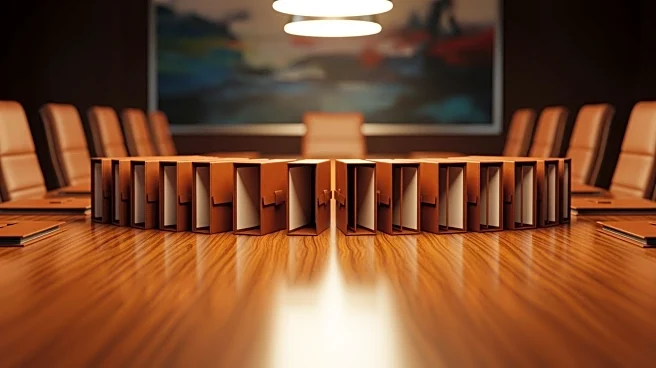What's Happening?
In a strategic move during USC's 38-17 victory over Northwestern, third-string quarterback Sam Huard executed a fake punt by wearing the same jersey number as the team's punter. Huard, who typically wears
No. 7, donned a No. 80 jersey, matching punter Sam Johnson's number, to complete a 10-yard pass to Tanook Hines. This play extended a drive that culminated in a touchdown. The change in jersey number was legally submitted and unnoticed until game day, showcasing the creativity of USC's coaching staff, led by Lincoln Riley. Northwestern's coach, David Braun, acknowledged the cleverness of the play, noting it as a learning experience for future games.
Why It's Important?
This incident highlights the strategic depth and creativity in college football, where coaches leverage every rule to gain an advantage. For USC, this play not only contributed to their victory but also demonstrated the team's ability to innovate under pressure. Such tactics can influence game outcomes and set precedents for future plays. For Northwestern, it serves as a reminder of the importance of thorough preparation and attention to detail. The broader impact on college football includes potential discussions on rule adjustments to prevent similar occurrences, ensuring fair play and transparency.
What's Next?
Following this game, other college football teams may scrutinize their opponents' rosters more closely to avoid being caught off guard by similar tactics. USC's successful execution of the play could inspire other teams to explore creative strategies within the rules. Additionally, the NCAA might consider reviewing regulations regarding jersey numbers and game-day roster submissions to maintain competitive integrity. Coaches across the league will likely emphasize the importance of detailed game-day preparations to their teams.
Beyond the Headlines
This event underscores the evolving nature of sports strategy, where innovation can provide a competitive edge. It also raises questions about the ethical implications of exploiting rule loopholes. While legal, such tactics may prompt discussions on sportsmanship and the spirit of the game. The incident could lead to a cultural shift in how teams approach game-day preparations, emphasizing adaptability and strategic foresight.









